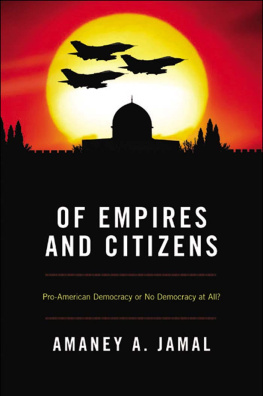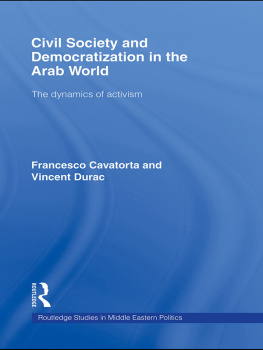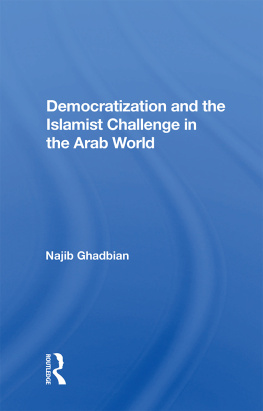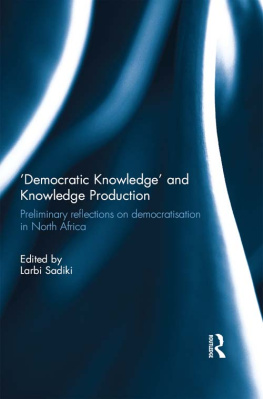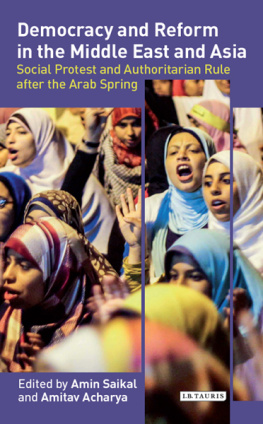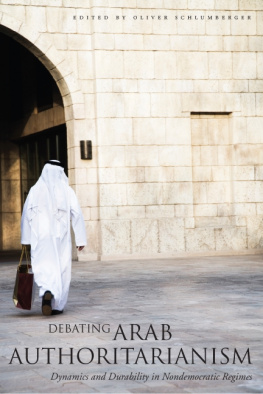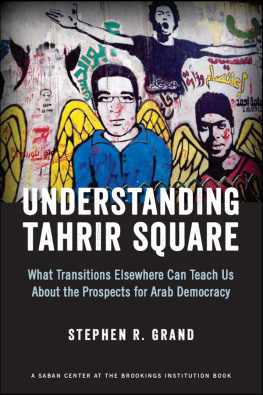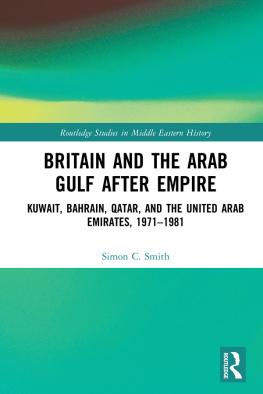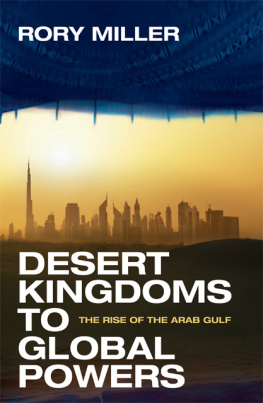Copyright 2012 by Princeton University Press
Published by Princeton University Press, 41 William Street,
Princeton, New Jersey 08540
In the United Kingdom: Princeton University Press, 6 Oxford
Street, Woodstock, Oxfordshire OX20 1TW
press.princeton.edu
All Rights Reserved
Library of Congress Cataloging-in-Publication Data
Jamal, Amaney A., 1970
Of empires and citizens : pro-American democracy or no
democracy at all? / Amaney A. Jamal.
p. cm.
Includes bibliographical references and index.
ISBN 978-0-691-14964-6 (hardcover : alk. paper)
ISBN 978-0-691-14965-3 (pbk. : alk. paper) 1. Democratization
Arab countries. 2. Islam and politicsArab countries.
3. DemocratizationGovernment policyUnited States.
4. United StatesForeign relationsArab countries. 5. Arab
countriesForeign relationsUnited States. 6. Anti
AmericanismArab countries. 7. Arab countriesPolitics
and government1945I. Title.
JQ1850.A91J348 2012
320.9174927dc23 2012008057
British Library Cataloging-in-Publication Data is available
This book has been composed in ITC Leagacy Serif Std
Printed on acid-free paper.
Printed in the United States of America
1 3 5 7 9 10 8 6 4 2
PREFACE
In 2012, events in the Arab world are rapidly unfolding. president Husni Mubarak of Egypt has resigned and the Supreme Council of the Armed Forces, the military, has assumed power. Citizens are jubilant that a dictator of thirty years has been asked to step downan outcome once considered unimaginable. Sticking to their protests in the face of threat and repression, the citizens of Egypt sent a sign that the ongoing living conditionsboth economically and politicallywere unacceptable. With a growing income gap, unemployment rates skyrocketing, and a youth population that knew nothing but Mubaraks rule, the population said kifayeh (enough)!
Yet what type of regime will replace Mubarak after (and if) the military steps down? This is the question that will occupy the minds of analysts, scholars, academics, and students of comparative and Middle East politics. Is Mubaraks exit the first stage of a democratic transition? Is it a final stage to military rule? Will there be substantial reforms? What will become of Egypts notorious Emergency Laws? What role will the Muslim Brotherhood play? What will happen to the peace treaty with Israel? And will ties to the United States remain close? There are some glaringly clear reminders that the future of Egypt is of vital importance not only to the citizens of Egypt but also to regional and international actors as well.
As the events of the Arab Spring unfolded, it became increasingly clear that while the average citizen on the ground was demanding more democracy, more accountability, better economic opportunities, transparency, and a better life, the international orderchiefly that of the United States was concerned about an Egyptian government that it could continue to work with. The international order had and has clear geostrategic interests in the area. The United States, through military and diplomatic channels, sent a message to Egyptians, including citizens, opposition movements, the regime in power, and to the regime yet to emerge: it is invested (and hopeful) in seeing a partner at the helm in Egypt.
What does this mean, however, for the future of democracy in Egypt? How do these geostrategic realities shape the ways in which citizens think about regime stability and democracy, and the role of the United States in their societies? And further, what do these negotiations mean for the future of democratic consolidation in Egypt and the Arab world more broadly?
This book addresses these questions by introducing the ways in which geostrategic, patron-client relations shape domestic-level negotiations about regime stability and prospects for democratization. While building on existing democratization theories and approaches, this book attempts to refine some of our understandings about democracy by linking the realities of the international order to domestic-level societal developments.
ACKNOWLEDGMENTS
This book would not have been possible without the alignment of so many factors. Family, friends, colleagues, workshops, and funding all contributed to this final product. Im grateful to many, many people. First and foremost, I thank my colleague Atul Kohli for encouraging me to take on a topic that at first I felt was too big and ambitious. His very constructive feedback at the early stages of this project was invaluable. Three other colleagues were also instrumental to this projectChristina Davis, Irfan Nooruddin, and Ellen Lust. They read the manuscript more times than they actually cared to and listened to me complain about the projectand even when they didnt understand why I was complaining, they still listened. For that I am grateful.
Generous feedback from my colleagues at Princeton University benefited this project enormously. I thank Deborah Yashar, Mark Beissinger, Nancy Bermeo, Evan Lieberman, Grigo Pop-Eleches, Rafaela Dancygier, Dani Campello, Lynn White, Helen Milner, Chris Achen, Gary Bass, and Jonas Pontusson. Several other colleagues also provided insightful feedback: Lisa Anderson, David Laitin, Lisa Wedeen, Shibley Telhami, Mark Tessler, Tarek Masoud, and Jillian Schwedler all offered helpful comments and significant suggestions.
This project involved a massive data collection effort in three countries: Jordan, Morocco, and Kuwait. I worked with several research assistants, translators, transcribers, and data specialists, and I would like to thank Alex Kobishyn, Tim Shriver, Eman Jamal, Nariman Zarzour, Sami Hermez, Abdullah AlSharrah, Courtney Emerson, Urooj Raja, Jennifer Dennard, Souha Rasheed, Tonya Howe, Gail Buttorf, and Dana Weinstein; your research assistance was a tremendous help. A very special thanks goes to Princetons Niehaus Center for Globalization and Governances support of Raymond Hicks for his outstanding research work on this project. I also continue to be very grateful to Chuck Myers, who is just fabulous to work with, and the anonymous reviewers who gave very valuable comments.
My colleagues in the Middle East have been a tremendous asset to my ongoing fieldwork. I wish to thank Dr. Khalil Shikaki, Dr. Fares Braizat, Dr. Mohammed al-Masri and Dr. Ghanim al-Najjar for their ongoing support and assistance.
The book was also shaped by the talks I delivered at several institutions. Im thankful for all my colleagues who asked me to deliver talks at the University of CaliforniaBerkeley, the University of WisconsinMadison, Harvard University, Princeton University, the University of IllinoisUrbana Champaign, the University of Minnesota, Boston College, Columbia University, the University of Michigan, the University of Pennsylvania, New York University, and Oxford University.
This project was well-funded and supported, and I am indebted to several organizations. In particular, I thank the Carnegie Scholars Program, the United States Institute of Peace, and Princeton University for providing the resources to complete this work.
Finally, the nurturing of this seven-year book project coincided with the growth of my four children. Asma started and finished college while I was working on this book. Lina finished her high school years and embarked for college. Ayah finished up elementary school and began middle school, and Maryam learned how to crawl, walk, talk and start preschool while Mom worked on the manuscript. When things got cluttered, they always kept me going. I thank my husband, Helmi, for his ongoing support and love. And finally, I thank my mother, Nidal Jamal, who continues to inspire me day in and day out.

